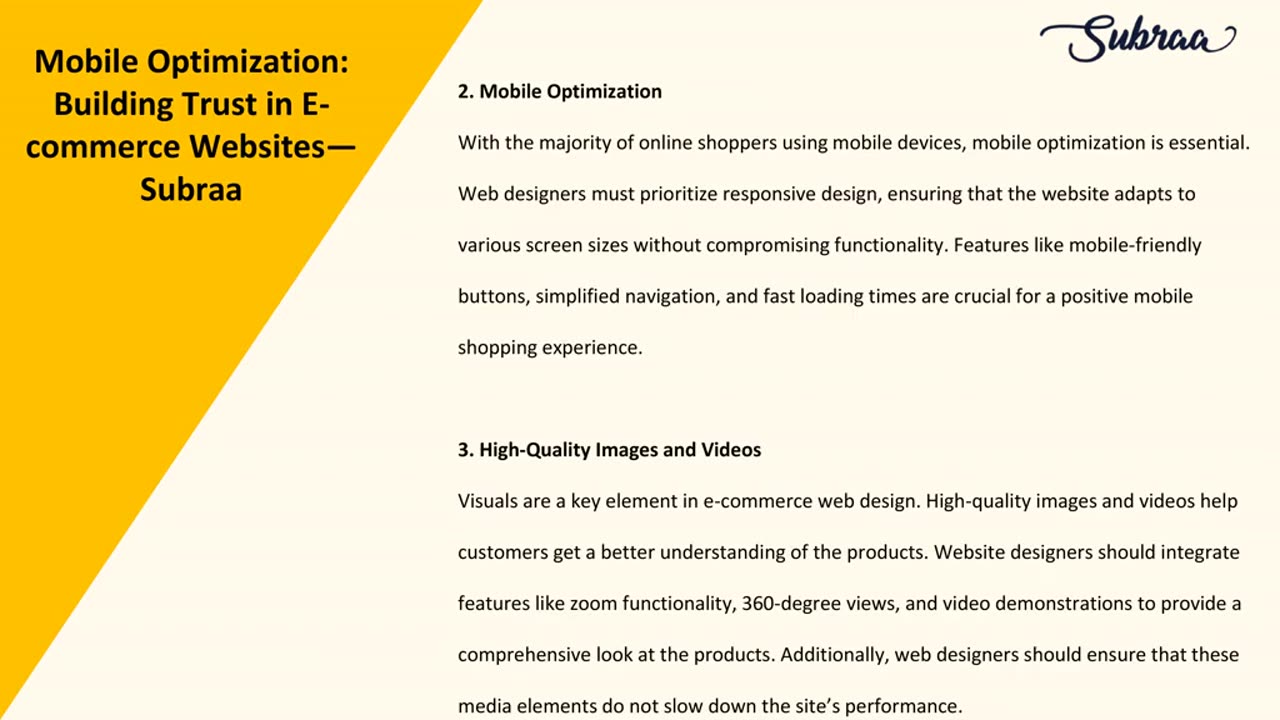Premium Only Content

Mobile Optimization: Building Trust in E-commerce Websites — Subraa
The role of web design in e-commerce cannot be overstated. A well-designed e-commerce website not only attracts customers but also enhances their shopping experience, leading to higher conversions and customer loyalty. Website designer Singapore https://www.subraa.com/freelance-web-designer-singapore-portfolio/ play crucial roles in creating these effective online stores. Here are some best practices for web design in e- commerce.
1. User-Friendly Navigation
A seamless user experience begins with intuitive navigation. Web designers Singapore https://www.subraa.com/freelance-web-designer-singapore-portfolio/ should focus on creating a clear, straightforward menu structure that allows customers to find products quickly. Implementing breadcrumb navigation, sticky headers, and a prominent search bar can significantly enhance usability. Web designers need to ensure that the navigation is consistent across all pages to avoid confusion.
2. Mobile Optimization
With the majority of online shoppers using mobile devices, mobile optimization is essential. Web designers must prioritize responsive design, ensuring that the website adapts to various screen sizes without compromising functionality. Features like mobile-friendly buttons, simplified navigation, and fast loading times are crucial for a positive mobile shopping experience.
3. High-Quality Images and Videos
Visuals are a key element in e-commerce web design. High-quality images and videos help customers get a better understanding of the products. Website designers should integrate features like zoom functionality, 360-degree views, and video demonstrations to provide a comprehensive look at the products. Additionally, web designers should ensure that these media elements do not slow down the site’s performance.
4. Fast Loading Times
Speed is a critical factor in e-commerce. Slow-loading pages can lead to higher bounce rates and lost sales. Website designers in Singapore should optimize images, leverage browser caching, and minimize the use of heavy scripts to improve loading times. Using a Content Delivery Network (CDN) can also help in speeding up the site.
5. Secure Payment Processing
Security is paramount in e-commerce web design. Website designers https://www.subraa.com/freelance-web-designer-singapore-portfolio/ need to integrate secure payment gateways and ensure the site complies with PCI-DSS standards. Features like SSL certificates, secure checkout processes, and visible trust badges help build customer trust. Web designers should also include clear privacy policies and terms of service to reassure customers.
6. Clear Call-to-Actions (CTAs)
Effective CTAs guide customers through the purchasing process. Web designer Singapore should place CTAs like “Add to Cart,” “Buy Now,” and “Checkout” prominently on product pages. The design should make these buttons stand out while being consistent with the overall site aesthetic. Web designers need to ensure that CTAs are easily accessible on both desktop and mobile versions of the site.
7. Customer Reviews and Ratings
Incorporating customer reviews and ratings into the e-commerce site can significantly influence purchasing decisions. Website designers should create space for customer feedback on product pages. Web designers need to ensure that the review system is user- friendly and integrates seamlessly with the product layout.
8. Simplified Checkout Process
A complicated checkout process can lead to cart abandonment. Website designers should focus on creating a streamlined, multi-step checkout process that is easy to navigate. Web designers can enhance this by offering guest checkout options, multiple payment methods, and clear progress indicators.
9. SEO and Analytics Integration
To attract organic traffic, e-commerce sites need to be SEO-friendly. Website designers should incorporate SEO best practices such as keyword optimization, alt text for images, and meta descriptions. Web designers should also integrate analytics tools like Google Analytics to monitor site performance and user behavior, providing valuable insights for continuous
improvement.
In conclusion, effective e-commerce web design requires a combination of aesthetic appeal, functionality, and user-centric features. By following these best practices, freelance website designers https://www.subraa.com/freelance-web-designer-singapore-portfolio/ can create compelling, efficient online stores that not only attract but also retain customers, driving business success in the competitive world of e-commerce.
Design here: https://www.subraa.com/
-
 1:20:31
1:20:31
Awaken With JP
5 hours agoWiping Hard Drives, Hire a Criminal Defense Lawyer - LIES Ep 79
65.1K41 -
 1:02:23
1:02:23
In The Litter Box w/ Jewels & Catturd
22 hours agoDEI Kills | In the Litter Box w/ Jewels & Catturd – Ep. 744 – 2/18/2025
97.5K51 -
 1:06:37
1:06:37
Game On!
4 hours ago $0.25 earnedBreaking Down COLLEGE BASKETBALL BETTING LINES Like a Pro!
17.7K3 -
 1:01:29
1:01:29
John Crump Live
6 hours ago $1.40 earnedMexico Backs Cartels By Threatening To Designate Gun Manufactures As Terrorist!
19.8K8 -
![[Ep 611] DOGE On The March! | Guest Sam Anthony - [your]NEWS | Seditious Dems | Ukraine](https://1a-1791.com/video/fwe1/97/s8/1/q/C/C/3/qCC3x.0kob-small-Ep-611-DOGE-On-The-March-Gu.jpg) 2:14:09
2:14:09
The Nunn Report - w/ Dan Nunn
4 hours ago[Ep 611] DOGE On The March! | Guest Sam Anthony - [your]NEWS | Seditious Dems | Ukraine
24.1K11 -
 1:00:56
1:00:56
The Tom Renz Show
10 hours agoThe War On DOGE Is ALSO A War On The Economy
28.7K7 -
 1:30:16
1:30:16
Steve-O's Wild Ride! Podcast
5 days ago $1.92 earnedAri Shaffir Exposes The Dark Side of Podcasting - Wild Ride #252
50.9K3 -
 1:56:29
1:56:29
The Quartering
8 hours agoAirplane FLIPS and CRASHES, Sean Duffy Slams Pete Buttigieg, & What Happened with Patriarchy Hannah
92.2K38 -
 37:08
37:08
Standpoint with Gabe Groisman
1 day agoDOGE The UK?! With Liz Truss
50.1K18 -
 56:39
56:39
SLS - Street League Skateboarding
6 days agoHIGHEST SCORING KNOCKOUT ROUND OF ALL TIME! Felipe Gustavo, Dashawn Jordan, Filipe Mota & more...
37.1K2